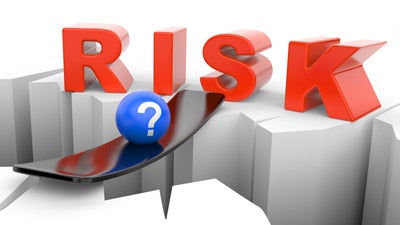Home > Run and Grow > Risk Management >
Start(up) After Answering These 3 Questions on Risk
By: Under30CEO

 Entrepreneurs are risk-takers, sacrificing everything to change the world. Let me know if this sounds familiar: A father of four risks his house and the livelihood of his wife and children in an effort to pursue his dream. After taking another mortgage on his house, his business flourishes and it all works out. But what happens when it doesn’t?
Entrepreneurs are risk-takers, sacrificing everything to change the world. Let me know if this sounds familiar: A father of four risks his house and the livelihood of his wife and children in an effort to pursue his dream. After taking another mortgage on his house, his business flourishes and it all works out. But what happens when it doesn’t?
Embracing risk is important; it’s part of being an entrepreneur. However, a fundamental difference exists between taking calculated risks and being reckless altogether.
I started my first company entering my final year of my undergrad. It was called Puresweats, and it focused exclusively on delivering the highest quality sweatpants sewn in Canada. I contracted out a designer from a local fashion school and set away building the first sample. After a couple of iterations, I found a garment manufacturing factory to work with.
After wearing and washing the final product for a few weeks, I realized that it failed to be the premium product I originally envisioned. It wasn’t a bad quality garment and I never received any complaints, but it was clear to me that it had to be sold at a price that made the business unsustainable.
Entrepreneurs are told that they should burn the bridges behind them. Don’t. It’s much easier to recover from a 5ft fall than a 100ft fall. Here are three questions related to risk that you should answer before getting started.
1. What are your knowledge deficits?
How much do you know about the business you plan to start? Are you venturing into a field with no prior experience, or is your startup an extension of what you already do? With Puresweats, I had no prior experience developing and retailing apparel. It was an uphill battle on a sinking ship.
My new venture is a local English writing, editing, and tutoring company. I’ve been doing all three for the last seven years. In fact, most of my revenue is derived from tutoring a class I was a teaching assistant for. The transition was easy.
But what if you want a venture into a field you have no prior experience in? I would recommend getting a job in that field, or a related one, to learn the day-to-day operational challenges. An added benefit is that any mistakes made on the job aren’t going to risk next month’s rent.
An entrepreneur is willing to sacrifice just about everything in order to be an entrepreneur. Sometimes, that means sacrificing being an entrepreneur—for the time being.
2. How much money are you willing to risk?
When my first company failed, I lost my initial budget of $5,000. I knew going in that there was a high risk of failure. I didn’t go in with the attitude that failure was okay, but I refused to ignore the possibility.
My original budget came from the concept of bankrolling, which is employed by most, if not all, serious poker players. To play at a particular table, you need 20x the buy-in amount. Therefore, a $200 buy-in requires a bankroll of $4,000. This helps protect you from the variance which often puts players out of commission in one pre-flop, all-in hand.
Business may not have the same swings as poker (worse in some cases), but there are a number of variables beyond your control. Bigger risks and greater volatility require a more substantial bankroll. If I re-launched Puresweats with what I know now, I would scour the globe for the best fabric. This would mean the incurrence of substantial travel and accommodation costs with no guarantee that I would accomplish my goal. This is a high risk move, and I would not be comfortable without a reasonable financial reserve.
Simply put, don’t risk more than you are willing to lose. Always have a plan B and be prepared to up your bankroll when you up the stakes. If your bankroll is insufficient, consider sitting out for now.
3. How can you effectively use the MVP approach?
The Minimum Viable Product (MVP) approach encourages the testing of specific, core assumptions in the cheapest and quickest way possible. While the testing stage might extend the product development life cycle, the risk reduction process ensures that your capital is employed only as necessary, and that the final product integrates a history of user feedback and testing.
For Puresweats, I set out to use the MVP approach by producing a limited amount of inventory. However, I failed to do adequate testing at enough intervals. I assumed too often that things were good enough. For my new company, I posted ads on Craigslist instead of starting a website. Until it was clear that people were willing to pay me to help them, I didn’t want to invest in registering as a business or printing business cards.
Always dig deeper to discover your hidden assumptions and be patient with the process. I got so tired of being a wantrepreneur that I just wanted to make progress. However, rushing the process doesn’t get you anywhere. It’s better to do right slow, than to do wrong quick.
Your goal as an entrepreneur is not to wear risk as a badge of honour, it’s to take calculated risks in small doses. While risking it all sounds exhilarating, just remember: it’s darkest before the dawn—but it’s also darkest just before it goes pitch black.
This article was originally published by Under30CEO
Stefan Seah holds a BBA and is working towards the CPA designation. He is also the Founder and President of www.writethisway.ca, a local English writing, editing, and tutoring services company operating out of Vancouver BC.
Published: October 17, 2013
1935 Views
1935 Views














